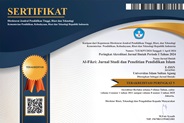UNSUR PEMBELAJARAN EDUTAINMENT DALAM QUANTUM LEARNING
Abstract
Early childhood learning uses the principle of playing while learning so that it must be arranged so that it is fun, uplifting, and democratic. Quantum Learning is a learning method that is loaded with edutainment concepts. Based on the studies conducted, the following conclusions are obtained: (1) Quantum learning and edutainment both emphasize the urgency of a pleasant and easy atmosphere; (2) Equally starting from the world of non-education; (3) Both give primary attention to an exciting learning process, which involves physical-sensory, emotional, and suggestive beliefs; (4) Quantum learning and edutaintment are able to foster student confidence; (5) Quantum learning builds student learning skills through a variety of cutting-edge discoveries, and edutainment continually seeks to facilitate optimal learning processes; (6) Quantum learning and edutaintment simultaneously build effective communication to students.
Â
Keywords: learning, quantum learning, edutaintmen
Full Text:
PDFReferences
Agnes, Lindsey, The True Magic of NLP, Yogyakarta: Garailmu, 2010
Bobbi DePorter, Quantum Learning: Membiasakan Belajar Nyaman dan Menyenangkan, Bandung: Mizan Learning Center, 1999
Bobby DePorter, Quantum Teaching; Mempraktekkan Quantum Learning di Ruang-Ruang Kelas, Bandung: Kaifa,2000
Coilin Rose, Kuasai Lebih Cepat, terj. Femmy Syahrani, Bandung: Kaifa, 2002
Hamruni, Edutainment dalam Pendidikan Islam dan Teori-Teori Pembelajaran Quantum (Yogyakarta: Fakultas Tarbiyah UIN Sunan Kalijaga, 2009).hlm 50
Hernowo, Menjadi Guru yang Mau dan Mampu Mengajar Secara Menyenangkan, Bandung: MLC, 2004
Program Pascasarjana UIN Sunan Kalijaga Yogyakarta, Pedoman Penulisan Tesis, Yogyakarta, 2008.
Slamet Suyanto, Dasar-dasar Pendidikan Anak Usia Dini, Yogyakarta: Hikayat Publishing, 2005.
Tony Buzan, Head Strong: Memperkuat Hubungan Otak dan Tubuh untuk Mendapatkan Fisik dan Mental yang Fit (Jakarta: Gramedia Pustaka Utama, 2003
DOI: http://dx.doi.org/10.30659/jspi.v2i2.5149
Refbacks
- There are currently no refbacks.
Al-Fikri is published by the Department of Islamic Religious Education, Faculty of Islamic Studies, Universitas Islam Sultan Agung, Semarang, Indonesia.

This work is licensed under a Creative Commons Attribution 4.0 International License








